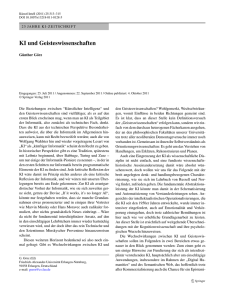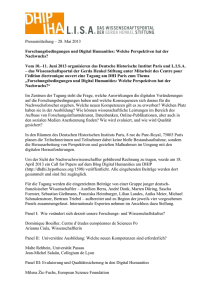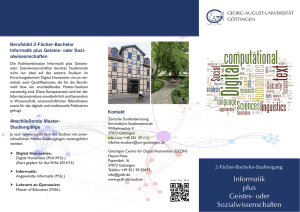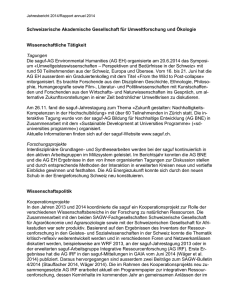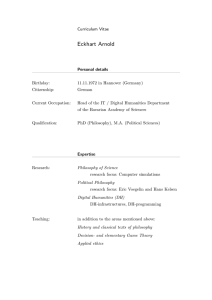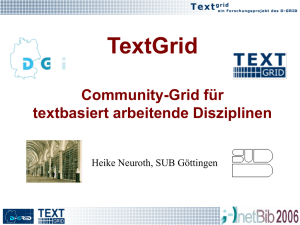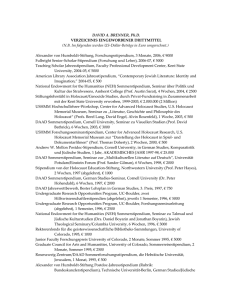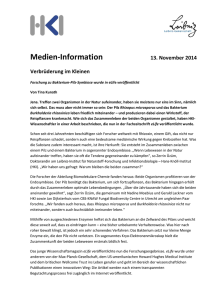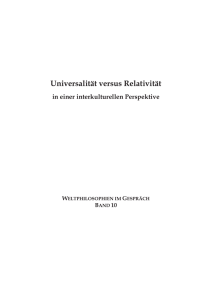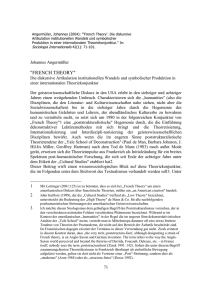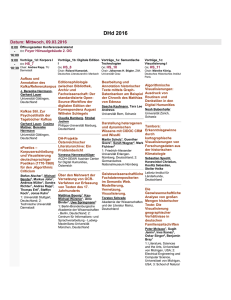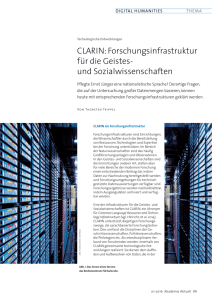Materialien dazu - Cologne Center for eHumanities
Werbung
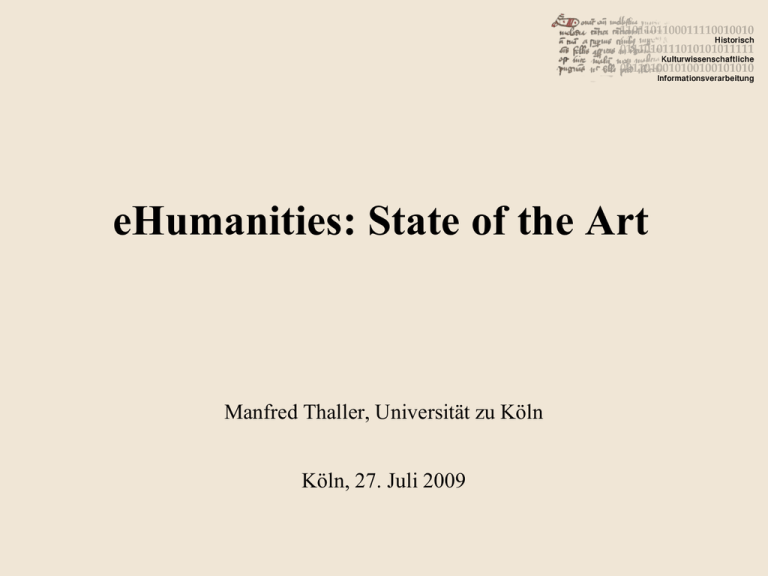
eHumanities: State of the Art Manfred Thaller, Universität zu Köln Köln, 27. Juli 2009 eHumanities: I Formalia eScience – laut BMBF Ziel ist die Entwicklung virtueller Wissensumgebungen, in denen die Nutzer dynamisch auf umfassende Datenbestände, Visualisierungen und wissenschaftliche Informationen aller Art zurückgreifen können. Damit sind auch künftig grundlegende Herausforderungen an die Entwicklung der wissenschaftlichen Informationsversorgung in Deutschland gestellt. Der schnelle Transfer von Forschungsergebnissen und die Aufbereitung und Verfügbarkeit relevanter wissenschaftlicher Informationen sind wichtige Faktoren zur Beschleunigung des Wissenstransfers und damit Motor für Innovationen. Neben der konventionellen Veröffentlichung wissenschaftlicher Ergebnisse als Produkt wird sich der gesamte Prozess der Generierung, Verarbeitung, Verbreitung und Archivierung von Wissen grundlegend ändern. Die neuen dynamischen Formen des wissenschaftlichen Arbeitens erfordern innovative Informationsinfrastrukturen und Dienstleistungen für wissenschaftliche Kommunikation, Information und Publikation. http://www.bmbf.de/de/298.php eHumanities – laut M. Thaller Zunächst ein Versuch, die Finanzierungstöpfe der eScience Begeisterung anzuzapfen. Die Vorstellung, dass jede Phase des wissenschaftlichen Arbeitsprozesses auch in den Geisteswissenschaften durch den Einsatz der IT „verbessert“ werden kann. Das sind: Informationsbeschaffung Informationsanalyse (C.P. Snow) Informationsverbreitung eHumanities – Europa http://www.dariah.eu/ DARIAH’s mission is to facilitate long-term access to, and use of all European arts and humanities data for the purposes of research. DARIAH is the digital research infrastructure that will connect scholarly data archives and repositories with cultural heritage for the arts and humanities across Europe, making scattered resources accessible through one click. DARIAH aims to create one European data area in which scholars and students can easily survey the available information in their field – data which is dependable in terms of both quality and durability. Research which builds on this data will expand the knowledge and understanding of our heritage, histories, languages and cultures. eHumanities – Europa http://www.clarin.eu/ The CLARIN project is a large-scale pan-European collaborative effort to create, coordinate and make language resources and technology available and readily usable. CLARIN offers scholars the tools to allow computer-aided language processing, addressing one or more of the multiple roles language plays (i.e. carrier of cultural content and knowledge, instrument of communication, component of identity and object of study) in the Humanities and Social Sciences. eHumanities – Worldwide http://projectbamboo.org/ Project Bamboo is an 18-month planning and community design program where through a series of conversations and workshops, we are mapping out the scholarly practices and common technology challenges across and among disciplines to discover where a coordinated, cross-disciplinary development effort can best foster academic innovation. … As we lay the roadmap for shared services development, we intend to create a rich community wherein any faculty member, scholar, or researcher can use and reuse content, resources, and applications no matter where they reside, what their particular field of interest is, or what support may be available to them. eHumanities – Deutschland http://www.textgrid.de/startseite.html Modulare Plattform für verteilte und kooperative wissenschaftliche Textdatenverarbeitung - ein CommunityGrid für die Geisteswissenschaften TextGrid errichtet eine grid-fähige Workbench für die gemeinschaftliche philologische Bearbeitung, Analyse, Annotation, Edition und Publikation von Textdaten für die Philologie, Linguistik und angrenzende Wissenschaften. eHumanities – Deutschland eHumanities – Deutschland SPP 1442 Digital Humanities : Research methods and practices in the context of new infrastructures "The term "e-Science" denotes the systematic development of research methods that exploit advanced computational thinking". The successful development of e-Science is based on providing access to vast amount of scientific data and tools to process them in order to enable new research methods. There is much hope that similar success is achievable in Humanities research. eHumanities – Deutschland SPP 1442 Digital Humanities : Research methods and practices in the context of new infrastructures Koordiniert von Göttingen (und Computerphilologie Community; vgl.: http://computerphilologie.unimuenchen.de/ejournal.html) 44 Antragsteller Köln: R. Förtsch; M. Thaller eHumanities – Deutschland Agenda 2020 für eHumanities in Deutschland (2007) Essentiell: Plädoyer für die Unterstützung datenintensiver Forschung auf der Basis kollaborativ bereit gestellter Werkzeuge, http://www.hki.uni-koeln.de/CCeH eHumanities – Deutschland Agenda 2020 für eHumanities in Deutschland (2007) Essentiell: Plädoyer für die Unterstützung datenintensiver Forschung auf der Basis kollaborativ bereit gestellter Werkzeuge, http://www.hki.uni-koeln.de/CCeH eHumanities – Deutschland Center for Digital Humanities – Universität Göttingen http://www.textgrid.de/fileadmin/TextGrid/konferenzen_ vortraege/eHumanities_0109/e-humanities%20%2005%20-%20e-Humanities-Potentiale%20%20CDH%20-%20Lauer.pdf Oder: http://www.hki.uni-koeln.de/CCeH eHumanities: II Realia eHumanities – Inhalt Im angelsächsischen Raum derzeit als Bibel: A Companion to Digital Humanities: http://www.digitalhumanities.org/companion/index.html eHumanities – Inhalt Companion: Identifizierte Disziplinen mit eigener „Digitaler Tradition“. 1. 2. 3. 4. 5. 6. 7. 8. 9. 10. 11. Archäologie Kunstgeschichte Classical Studies Geschichte Lexikographie Linguistik Literary Studies [ Editionsphilologie ] Musik Multimedia Performing Arts Philosophie und Religion eHumanities – Inhalt 1. Textbasiert: "Literary Computing" / Editionsphilologie. Computerlinguistik. 2. "Faktenanalyse": Quantitativ / datenbankgestütztes "Historical computing". GIS fokussierte Untergruppe. Simulationsorientierte Untergruppe. 3. Analyse nicht-textueller Information: „Sensorische Disziplinen". Kulturerbe. 4. "Humanities Computer Science": Algorithmische Orientierung. Epistemologie geisteswissenschaftlicher Information. eHumanities – Deutschland eHumanities – Inhalt Computerphilologie als Studiengang: Universität Bielefeld: Bachelor-Nebenfach Texttechnologie Technische Universität Darmstadt: Master of Arts Linguistic and Literary Computing [ Hamburg ] Bayerische-Julius-Maximilians-Universität Würzburg: M.A. EDVPhilologie
